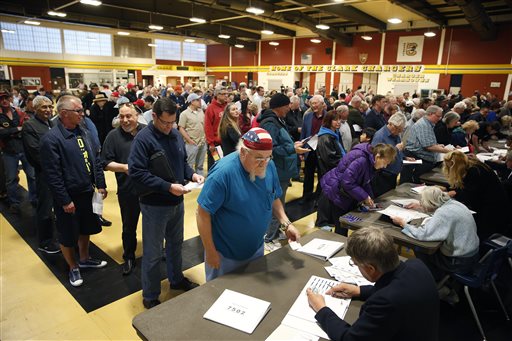Trump building more than a wall, Clinton cooling down The Bern
As primary moves closer to Super Tuesday, front runners stay in drivers seat

Crowds of people line up to get a ballot at a Republican caucus site, Tuesday, Feb. 23, 2016, in Las Vegas. (AP Photo/John Locher)
February 24, 2016
In the third round of primary elections for the Democrats and Republicans, the American people once again saw much of the same.
For the Democrats in Nevada, it was another unbelievably close race between the two remaining presidential hopefuls. It may not seem shocking that Sen. Sanders and his supporters have been putting up a tough fight with Hillary Clinton if one were to only analyze the data from the past month or two, but according to poll numbers gathered after the first Democratic debate in October, Clinton had a 45% to 29% lead over the Vermont Senator.
And many Nevada voters were certainly ‘feeling the Bern’, as at several times during the voting on Saturday the two Democrats were almost at a complete tie with just a percentage point or two separating them. However, the former Secretary of State would later put a few more percentage points to end the voting about 5% higher than Sen. Sanders, bringing her twenty more delegates, making her total fifty-two, just one above her remaining competition.
Just a quick Google search will show that Clinton’s total is 503 delegates, opposed to Sanders’ 70, however that is taking into account the Democratic Party’s confusing use of unofficial delegates called ‘superdelegates’.
Moving into South Carolina and Super Tuesday, a day in which sixteen different primary elections are held, things will heat up between the two as there will most likely be some distance placed between the two.
Over on the Republican side, things were done slightly differently than how they were done for the Democrats in Nevada. South Carolina operates on a winner-take-all basis which boded well for the current Republican frontrunner, Donald Trump.
Despite winning by only a ten point margin over Sen. Marco Rubio and Sen. Ted Cruz, Trump walked away from the Palmetto State with all fifty delegates, launching his total to seventeen to sixty-seven.
This primary election put a little distance between Trump and his closest competitors, Ted Cruz and Marco Rubio. The Texas Senator is currently in second with just eleven delegates, with a lead over Rubio by just one delegate.
The lead presented to the Pope-battling businessman by South Carolina may seem catastrophic for the other candidates, especially for Jeb Bush, as the joyful tortoise was felled by the dingy yellow hare and dropped out of the race Saturday night. However when the Republican candidates need just over 1,200 delegates to win the nomination, it becomes clear that this is still just the beginning.
From yesterday’s caucus results in Nevada for the Republicans, Trump once again pulled together the votes for the number one spot. Receiving about 46% of the votes and twelve pledged candidates, Trump’s momentum and lead stretch even further. Boasting a new total of 80 delegates compared to Cruz’s 16 delegates and Rubio’s 14, it appears that Trump’s momentum is not yet fading.









